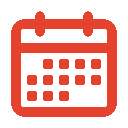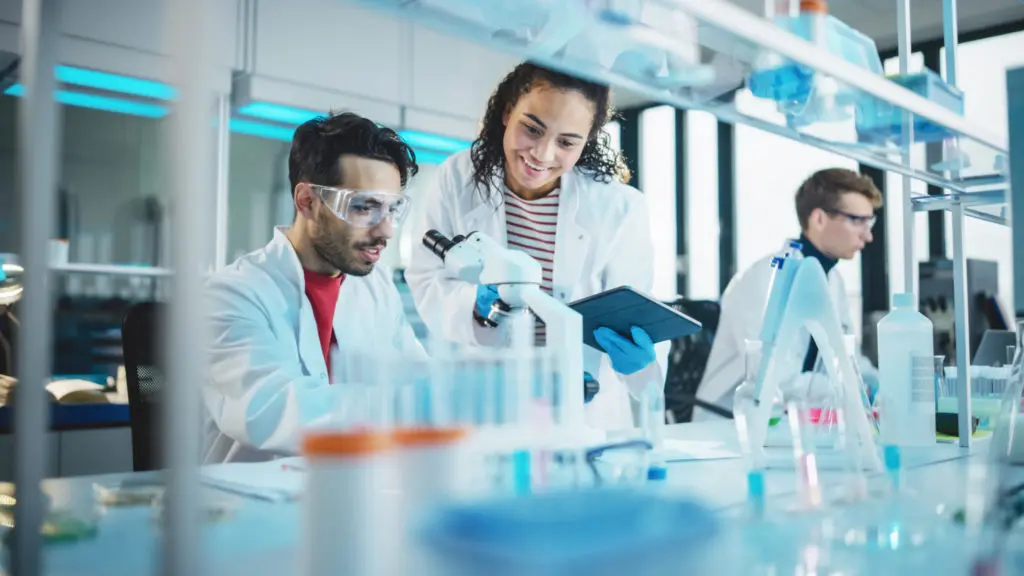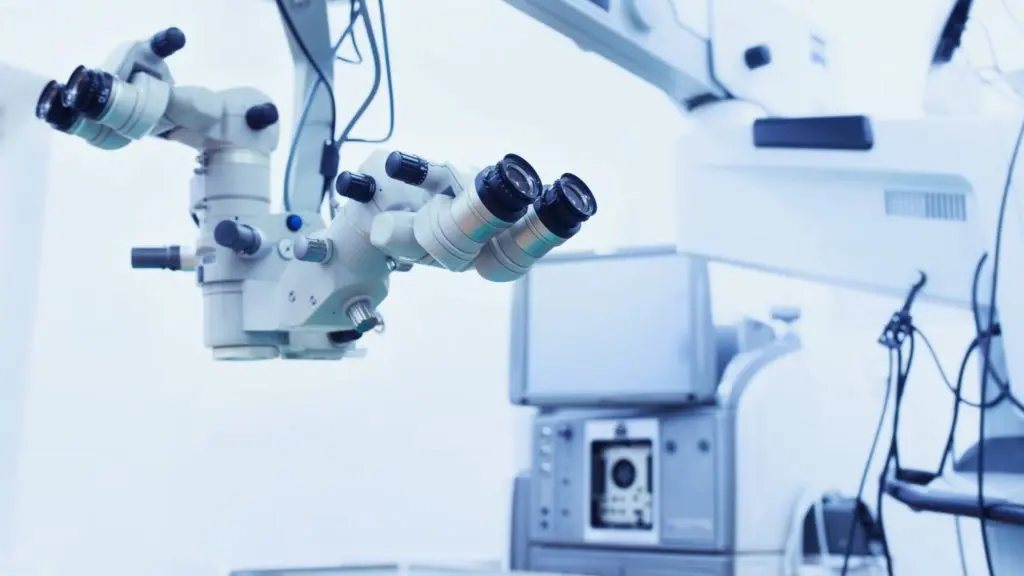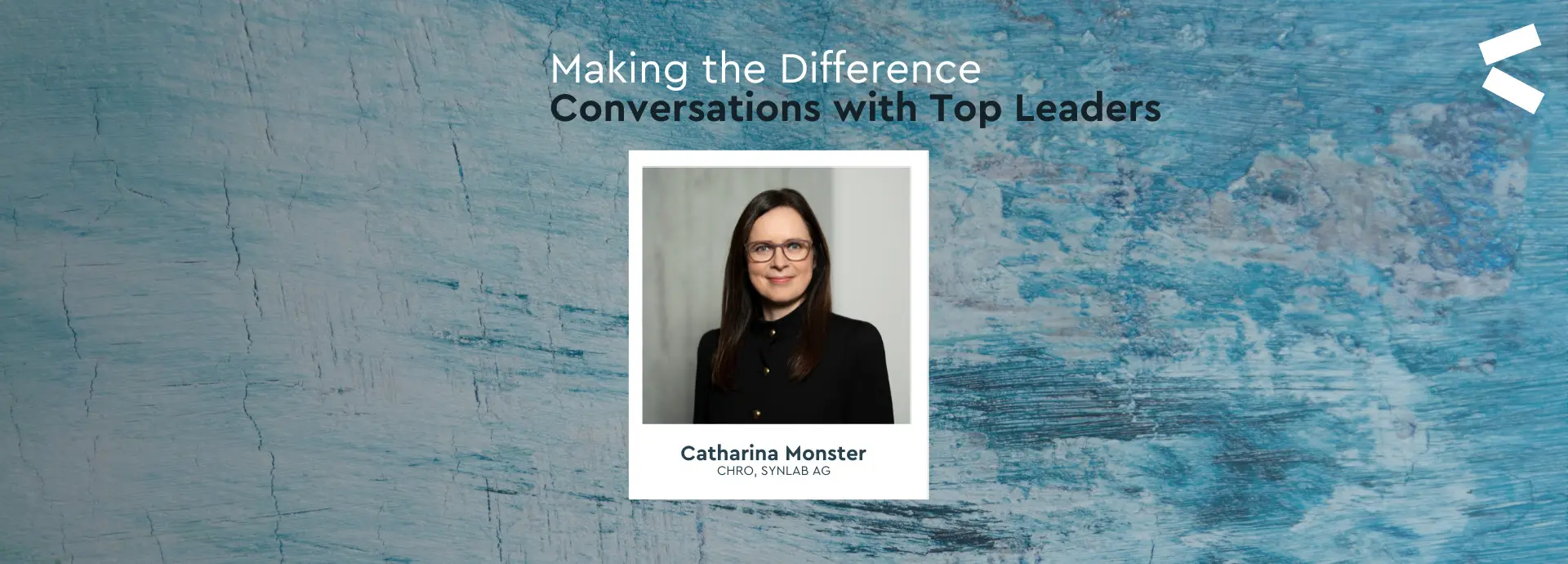
“Change is not happening overnight”
“If the benefit of the change is not visible or convincing, especially in our decentralised model, then you will face many difficulties in implementing a project successfully.”, says Catharina Monser, CHRO at SYNLAB International. In conversation with Alexander Mischner-Kuck, Director & Partner in Executive Search for Life Sciences & MedTec , she shares her take on leadership, the company’s change scenario and their leadership model.
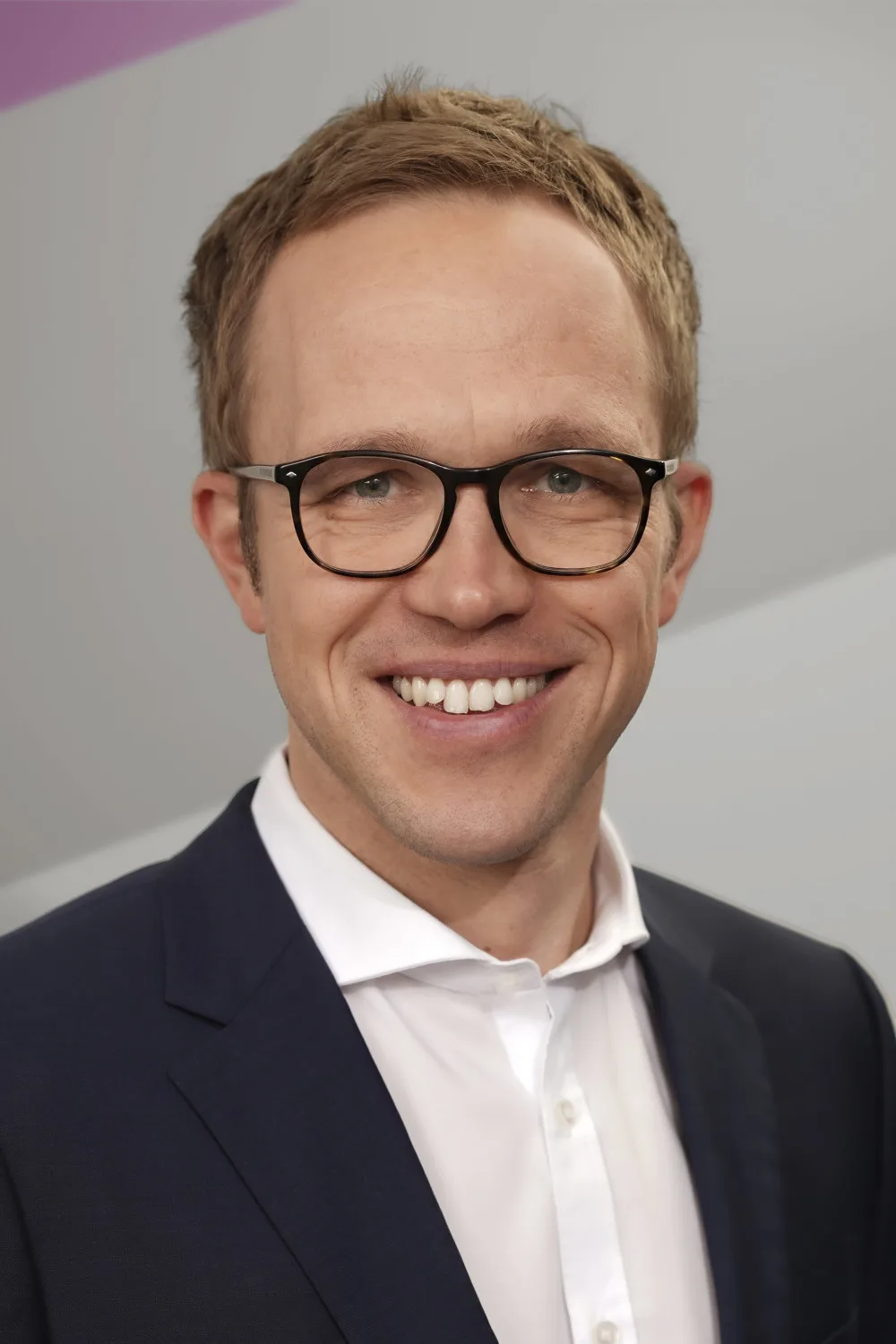
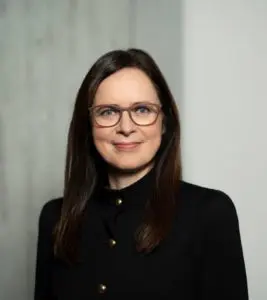
Catharina Monster, CHRO, SYNLAB AG
Catharina, SYNLAB is a really interesting organisation. Founded slightly more than 20 years ago, your company – in a relatively short time – has grown into one of the biggest lab services providers in the world, which is why I am really excited to talk to you as an HR changemaker today! From a general perspective, how do you make a difference in terms of contemporary leadership?
Thank you for the invitation. Being part of the Kienbaum “Making the Difference” series is a nice recognition for a leader in the HR field. To be a good leader, you need to be authentic and that starts with yourself by knowing who you are as a person and who you want to be as a leader. This means following both your own and the company’s values, showing that you are trustworthy and that you are able to take things forward.
What, particularly in your professional life, has influenced and shaped your understanding of leadership?
I often ask myself: If I were to retire today, what parts of my career would I be most proud of? Or when reflecting on my current leadership role: Have I worked on topics that make a difference? How do employees look at me? Have I been an authentic leader? Have I been ethical and trustworthy; someone who employees like to work for etc.? I believe that contemplating where one currently stands versus where one would like to be is of critical importance, as is requesting genuine feedback from employees and colleagues. This is what helps to form you. All leaders are different, and I don’t have any particular one who influenced me the most. Every leader has his/her own characteristics, which have all contributed to my own leadership style. Uniqueness is key, as is showing that you care about your employees and that you treat them the way they like to be treated. Most of all, it is important that you are a genuine, engaged, and engaging leader.
How do you apply that in the very agile, dynamic, rapidly growing, and heterogeneous environment of SYNLAB?
SYNLAB is a decentralised organisation. In my Group functional leadership role, you need to have a good understanding of the business and to be able to find a balance between what is required from the Group versus the local needs. Involvement with the key stakeholders at an early stage is key to alignment on the Group approach. Being agile, when possible, but also making it clear that there are certain Group requirements which are critical and can’t be changed. From a Group perspective you, therefore, need to understand what is critical, what will add value to the business and what would be a proper change management approach.
At SYNLAB, you are facing a particular challenge. There isn’t just one culture that has to be transformed into a new contemporary one. But as a result of the acquisition history of your company, there are a bunch of different leadership cultures that need to be turned into one consistent leadership that is in line with the values and the strategy of the company. How do you deal with that situation which is even more complex in relation to other companies?
As an industry consolidator with a strong track record in M&A, SYNLAB decided to create a SYNLAB culture that strongly links to our strategy and to our Mission and Values. We started the journey within SYNLAB to develop a Leadership Model which describes the behaviours/capabilities of our leaders. With the involvement of more than 300 international leaders, we defined the Leadership Model together. In the coming years, we will train our leaders and include the leadership skills in the different processes and leadership programmes that we have in place. With this model, we will connect our newly required companies to the SYNLAB culture.
Everyone who has ever been occupied with such a change process knows that it does not happen instantly, but rather takes much more time and repeated actions. So how do you facilitate this process from a clear theoretical leadership model into a leadership culture, which is really put into action on a daily operational level?
Change is not happening overnight. A key success factor is when top management is behind the change itself. The approach, the way forward etc. needs this alignment to be successful in the end. At a Group level, we have made an ESG commitment to training all leaders. That is a strong commitment which will support the change. Besides an agreed implementation plan, we are taking every opportunity to internalise and present the model; messaging and communication are key. To give an example: we have an internal department that helps with training development. They take this model in their existing training and in several country organisations, we have well-developed leadership programmes that are adapting the model in their existing programmes.
Yet, in my experience, change is not always embraced and welcomed equally. There are still many people who fear any sort of change in the organisation. How do you personally as a leader, as the CHRO of the company, create an atmosphere that is welcoming to change and that motivates people to take part?
What is most important is the way it is done, and that means that it is not a top-down decision. When it comes to a leadership model or other projects, we always have alignment with the key stakeholders to make sure that what we do makes sense for the development of our company. If the benefit of the change is not visible or convincing, especially in our decentralised model, then you will face many difficulties in implementing a project successfully.
Covid-19 actually leads to my next question: on top of this change situation, you had an exceptionally challenging situation during the Covid-19 pandemic as a company providing lab analytical services for human medicine. SYNLAB as a company had a sharply increasing business which really had a drastic impact on the employee’s workload. How were you, in such an exceptional situation, able to maintain this changing path? In a situation in which everyone might say: Ah, come on, let’s skip change, we have more urgent things to do at the moment.
First of all, I want to reflect on the two years of unbelievably hard work helping society in the fight against the pandemic. At SYNLAB, we have many “heroes” around the world that have done unbelievable work. We have incredible stories about what our employees have done to help society. Across our network country organisations, different departments and the Group worked so closely together. Additionally, we built up staff and infrastructure to increase our testing capabilities according to demand. That was an unbelievable journey. Just imagine, at the beginning of last year, when demands for SARS-CoV-2 testing peaked during the Omicron wave, many of our employees even offered to skip their holidays. They wanted to be there and help fulfil our mission.
Your point is that this exceptional situation created a special spirit of togetherness, a kind of let’s roll up our sleeves and make things happen spirit, isn’t it?
Absolutely! We as a diagnostic services provider constantly monitored the evolution of Covid-19. We also had to protect our own employees. Especially last year, a lot of employees had Covid-19 themselves and when you have the virus, you can’t work. That was certainly not easy, but I think people now understand much more about the importance of medical diagnostics. Together with physicians, medical professionals and hospital laboratories we are the backbone of any healthcare system. More so, diagnostics provide the basis for most medical treatment decisions and play a key role in prevention, an area of increasing focus. In this situation, the desired new spirit and culture came into effect: the “local countries versus Group” scenario that you often find in internationally working companies ceased, and in return was replaced with an unbelievable amount of passion and accountability, as well as a stronger level of cooperation amongst all teams.
It is good to see that you were able to regard this exceptional challenge as a great chance to promote this cultural change! That is a great achievement in my opinion. One other consequence of the pandemic was that it forced everyone to stay at home and work remotely. I have been wondering for some time about the impact that this has on contemporary leadership, i.e., to what extent it changes the whole situation. What is your view on that?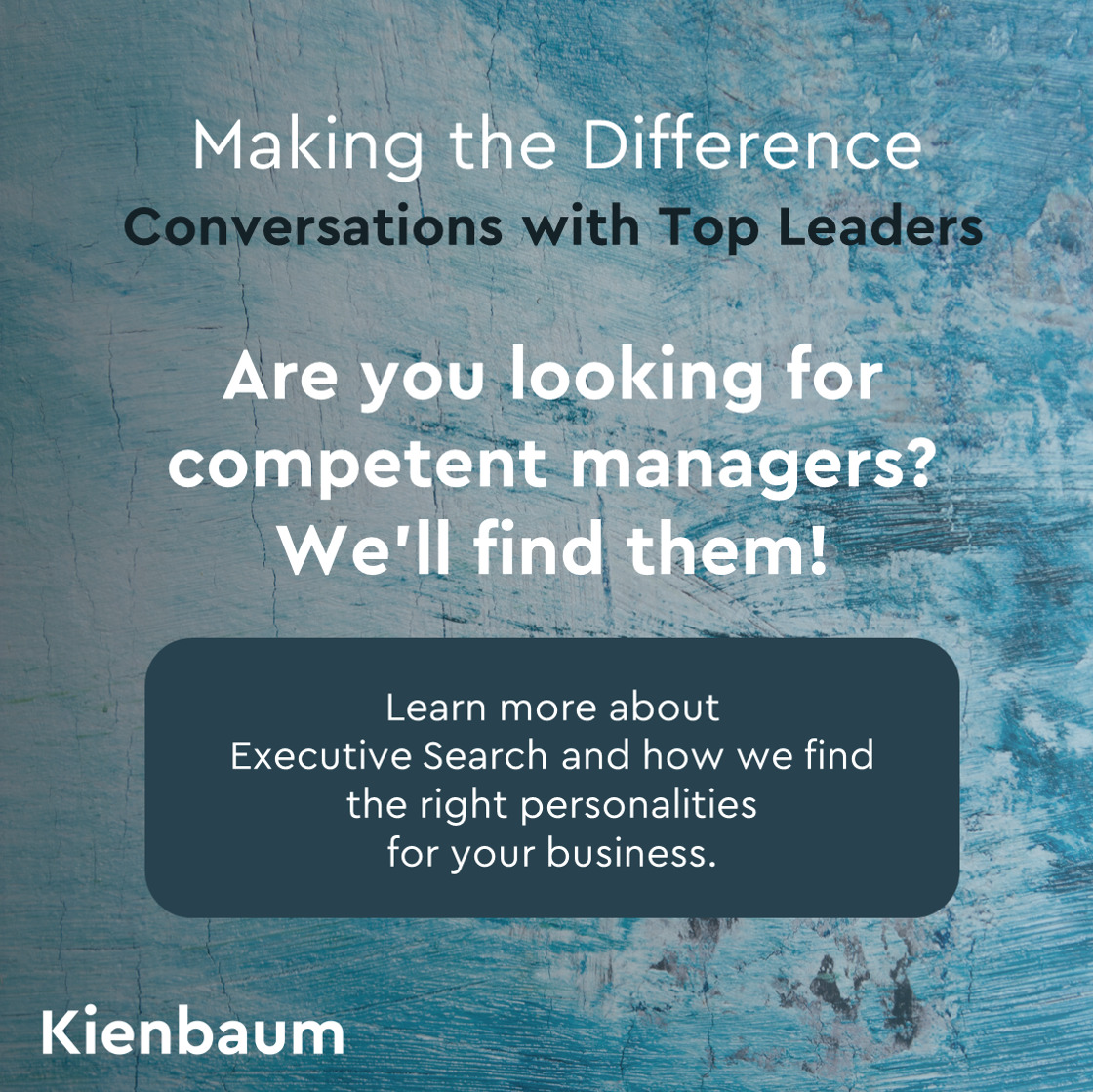
Well, it was a change for sure when we had the Covid-19 situation. The office employee could work from home due to government regulations, but our medical experts and laboratory specialists were needed in the lab. For SYNLAB it was also a mixture of who could stay at home and who had to be at the workplace, and this was different in every country. Today, after the Covid-19 period, many of our countries have adopted a hybrid solution, which we also have in our headquarters. Our activity requires us to perform most of our work is done on-site, be it in a laboratory or, for example, in a car, if you think of our sample drivers. For our office employees, however, a hybrid – partly working from home – solution is possible. In our case, we decided that each country can determine their own approach that works for its employees and meets the legal framework.
During the Covid-19 time, but also after this period, it has been important to find ways to stay connected with our employees. Indeed, social interaction is what people miss most when they only have video calls. Most people then go immediately to the topic, immediately to the point. There is much less social interaction and informal conversation. This, too, is a change that takes some time and wise leadership to bring about the ideas and tools that will enable an organisation to find a routine that works for everyone.
In a nutshell, what would be the most important advice you would give to other leaders in a similar situation?
Have clear guidelines. When it comes to working from home, make everything clear from the start. Find a balance between the flexibility of working remotely versus being in the office. But do not forget, and this is my most critical message, to find a way to connect employees with each other so that they all feel that they belong to one team, as part of a great company.
About the interviewee:
SYNLAB AG is a company offering laboratory services with a turnover of €3.25 billion in 2022 and is present in 36 countries with around 30,000 employees worldwide. Catharina Monster is responsible for HR, reporting to the Group CEO, and is part of the Executive Committee. Besides HR, she also has ESG in her portfolio. Last year they started the SYNLAB foundation, which Catharina is the Chairwomen of. She is an experienced (International) Group Chief Human Resources Officer and business leader with a demonstrable history of working in the Healthcare/Mining/Construction/Transportation and Machining Solution industries. When starting at the company in November 2020, SYNLAB was a private company which was then listed on the Frankfurt stock exchange at the end of April 2021.
Any questions? Don’t hesitate to contact us!
Alexander Mischner-Kuck | Mail: Alexander.Mischner@kienbaum.de | Phone: +49 211 96 59-318
